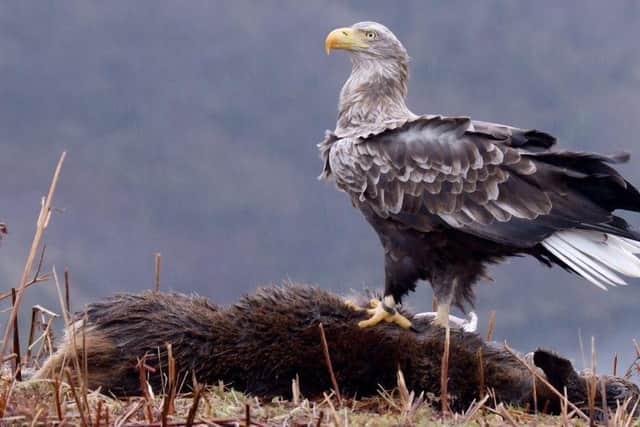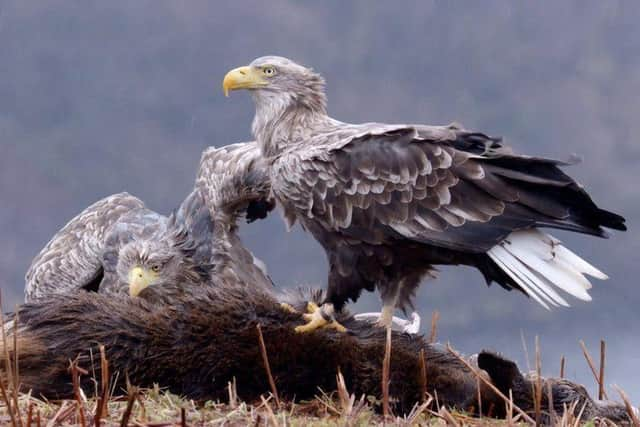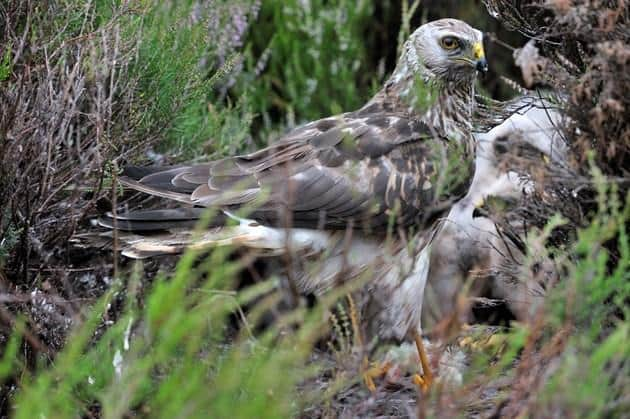UK's oldest sea eagle captured on a kill by BBC Winterwatch cameraman
The male is called Skye, after the island where he hatched in 1994.
Now in his 28th year, the bird of prey, which is also known as a sea eagle, was identified by a British Trust for Ornithology (BTO) ring attached to a leg before he fully fledged.
Advertisement
Hide AdAdvertisement
Hide AdThe number - ZZ0768 - was visible in footage shot by cameraman Jim Manthorpe for Winterwatch.


Skye's mate of 25 years, Frisa, would be older at 30 years old, if ornithologists can confirm she is still alive.
Frisa hatched on Mull in 1992.
A female was filmed with Skye, but her ring was turned away from the camera and the identification numbers were not visible.
RSPB Scotland said work was continuing to confirm Frisa was still on Mull with Skye.


The white-tailed eagle is the UK's largest bird of prey and can have a wingspan of more than 2m (6.5ft).
The UK population was wiped out by the early 20th Century and today's birds are descended from reintroduced eagles.
Meanwhile, Scotland’s wildlife watchdog has restricted a Perthshire estate’s general licences to control certain species after an endangered hen harrier was discovered dead in an illegally set spring-trap.
NatureScot has restricted the use of general licences on Lochan Estate which is regarded as one of the finest grouse shoots in the country. The decision was made on the basis of evidence provided by Police Scotland of wildlife crime against birds.


Advertisement
Hide AdAdvertisement
Hide AdGeneral licences allow landowners or land managers to carry out actions which would otherwise be illegal, including controlling common species of wild birds to protect crops or livestock. Corvids such as crows, and sometimes pigeons, are controlled by traps which have to be inspected every 24 hours.
Donald Fraser, NatureScot’s Head of Wildlife Management, said: "We are committed to using all the tools we have available to tackle wildlife crime. In this case, there is clear evidence that crime involving a wild bird occurred on this property. Because of this, and the risk of more wildlife crimes taking place, we have suspended the general licences on this property for three years. They may still apply for individual licences, but these will be closely monitored.
“This measure will help to protect wild birds in the area, while still allowing necessary land management activities to take place, although under tighter supervision. We believe this is a proportionate response to protect wild birds in the area and prevent further wildlife crime.
“We work closely with Police Scotland and will continue to consider information they provide us on cases which may warrant restriction of general licences. The detection of wildlife crime can be difficult but new and emerging technologies, along with a commitment from a range of partners to take a collective approach to these issues, will help us stop this from occurring in the future.”
Restrictions will prevent people from using the general licences on the land in question for three years. This period can increase if more evidence of offences comes to light.
The estate, which was approached for comment, states that it consists of 10,000 acres of high ground for grouse and low ground for pheasant, partridge and duck.
A message from the Editor:
Thank you for reading this article. We're more reliant on your support than ever as the shift in consumer habits brought about by coronavirus impacts our advertisers.
If you haven't already, please consider supporting our trusted, fact-checked journalism by taking out a digital subscription.
Comments
Want to join the conversation? Please or to comment on this article.